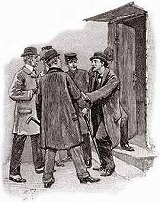“It was torn out of the dead man’s hand. Why was someone so anxious to get possession of it? Because it incriminated him. And what would he do with it? Thrust it into his pocket, most likely, never noticing that a corner of it had been left in the grip of the corpse. If we could get the rest of that sheet it is obvious that we should have gone a long way towards solving the mystery.”
“Yes, but how can we get at the criminal’s pocket before we catch the criminal?”
“Well, well, it was worth thinking over. Then there is another obvious point. The note was sent to William. The man who wrote it could not have taken it; otherwise, of course, he might have delivered his own message by word of mouth. Who brought the note, then? Or did it come through the post?”
“I have made inquiries,” said the inspector. “William received a letter by the afternoon post yesterday. The envelope was destroyed by him.”
“Excellent!” cried Holmes, clapping the inspector on the back. “You’ve seen the postman. It is a pleasure to work with you. Well, here is the lodge, and if you will come up, Colonel, I will show you the scene of the crime.”
We passed the pretty cottage where the murdered man had lived and walked up an oak-lined avenue to the fine old Queen Anne house, which bears the date of Malplaquet upon the lintel of the door. Holmes and the inspector led us round it until we came to the side gate, which is separated by a stretch of garden from the hedge which lines the road. A constable was standing at the kitchen door.
“Throw the door open, officer,” said Holmes. “Now, it was on those stairs that young Mr. Cunningham stood and saw the two men struggling just where we are. Old Mr. Cunningham was at that window - the second on the left - and he saw the fellow get away just to the left of that bush. So did the son. They are both sure of it on account of the bush. Then Mr. Alec ran out and knelt beside the wounded man. The ground is very hard, you see, and there are no marks to guide us.” As he spoke two men came down the garden path, from round the angle of the house. The one was an elderly man, with a strong, deep-lined, heavy-eyed face; the other a dashing young fellow, whose bright, smiling expression and showy dress were in strange contrast with the business which had brought us there.
“Still at it, then?” said he to Holmes. “I thought you Londoners were never at fault. You don’t seem to be so very quick, after all.”
“Ah, you must give us a little time,” said Holmes good-humouredly.
“You’ll want it,” said young Alec Cunningham. “Why, I don’t see that we have any clue at all.”
“There’s only one,” answered the inspector. “We thought that if we could only find- - Good heavens, Mr. Holmes! what is the matter?”

My poor friend’s face had suddenly assumed the most dreadful expression. His eyes rolled upward, his features writhed in agony, and with a suppressed groan he dropped on his face upon the ground. Horrified at the suddenness and severity of the attack, we carried him into the kitchen, where he lay back in a large chair and breathed heavily for some minutes. Finally, with a shamefaced apology for his weakness, he rose once more.
“Watson would tell you that I have only just recovered from a severe illness,” he explained. “I am liable to these sudden nervous attacks.”
“Shall I send you home in my trap?” asked old Cunningham.
“Well, since I am here, there is one point on which I should like to feel sure. We can very easily verify it.”
“What is it?”